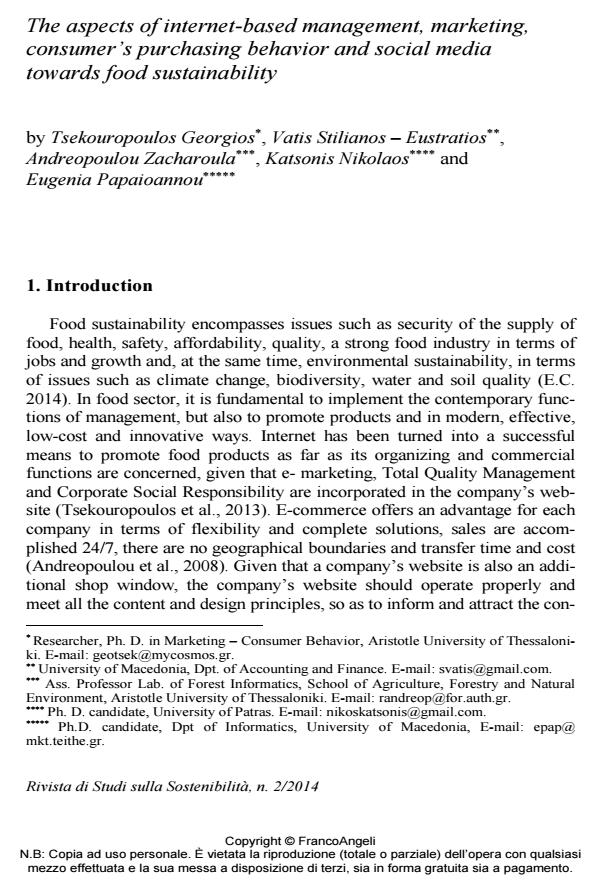The aspects of internet-based management, marketing, consumer’s purchasing behavior and social media towards food sustainability
Titolo Rivista RIVISTA DI STUDI SULLA SOSTENIBILITA'
Autori/Curatori Tsekouropoulos Georgios, Vatis Stilianos-Eustratios, Andreopoulou Zacharoula, Katsonis Nikolaos, Eugenia Papaioannou
Anno di pubblicazione 2014 Fascicolo 2014/2
Lingua Inglese Numero pagine 16 P. 207-222 Dimensione file 276 KB
DOI 10.3280/RISS2014-002013
Il DOI è il codice a barre della proprietà intellettuale: per saperne di più
clicca qui
Qui sotto puoi vedere in anteprima la prima pagina di questo articolo.
Se questo articolo ti interessa, lo puoi acquistare (e scaricare in formato pdf) seguendo le facili indicazioni per acquistare il download credit. Acquista Download Credits per scaricare questo Articolo in formato PDF

FrancoAngeli è membro della Publishers International Linking Association, Inc (PILA), associazione indipendente e non profit per facilitare (attraverso i servizi tecnologici implementati da CrossRef.org) l’accesso degli studiosi ai contenuti digitali nelle pubblicazioni professionali e scientifiche.
In the present electronic era, all companies tend to adopt in some extend internet- based features aiming to be compatible and viable and support food sustainability. In this paper, SMEs in the Food and Beverage sector were surveyed aiming to study the employ in their websites of contemporary managerial and marketing functions and social media. There was used a sample of 80 Greek SMEs in Macedonia, in Northern Greece. Findings of the research show that strategic planning and the quality control features appear in almost half of the surveyed SMEs, while organizing planning features appear in lower percentages. Concerning marketing, there is not a standard IT adoption rate, which varies from a simple informational, promotional and advertisement SME presence, to the total accomplishment of electronic orders and epayments. Moreover, most of the SMEs appear to adopt a responsible attitude, as far as social responsibility or green marketing is concerned. Furhter, almost half of the SMEs are connected to the Social Media, so as to boost their productivity, innovation and fame. Results of the study aim to contribute to the construction of a new model of organization of SMEs in food and beverage sector and in food chain in general, more respondent to the claims of well being of the consumer using internet- based features towards the food sustainability goal.
Nell’attuale era elettronica, tutte le societa tendono ad adottare in una certa misura le funzioni di internet, con l’intento di essere compatibili e praticabili e di favorire la sostenibilita alimentare. In questo documento, le piccole e medie imprese (PMI) nel settore alimentare e delle bevande sono state analizzate al fine di studiare l’impiego nei loro siti web delle moderne funzioni di gestione e di marketing e dei social media. E stato utilizzato un campione di ottanta PMI greche in Macedonia, nella Grecia settentrionale. I risultati della ricerca mostrano che le funzioni di pianificazione strategica e controllo di qualita appaiono in quasi la meta delle PMI analizzate, mentre le funzioni di pianificazione organizzativa appaiono in percentuali inferiori. Relativamente al marketing, non c’e una percentuale standard di utilizzo, la quale varia da un semplice scopo informativo, promozionale e pubblicitario delle PMI, alla totale realizzazione di ordini e pagamenti elettronici. Inoltre, la maggior parte delle PMI sembra assumere un atteggiamento responsabile, per quanto riguarda la responsabilita sociale o il green marketing. Ancora, quasi la meta delle PMI e collegata ai Social Media, in modo da aumentare la loro produttivita, innovazione e fama. I risultati di questo studio intendono contribuire alla costruzione di un nuovo modello di organizzazione delle PMI nel settore alimentare e delle bevande e nella catena alimentare in generale, piu rispondente alle rivendicazioni del benessere del consumatore utilizzando le funzioni di internet verso l’obiettivo della sostenibilita alimentare.
Parole chiave:Sostenibilita alimentare, marketing, pubblicita, e-commerce, PMI, comportamento d’acquisto dei consumatori, pianificazione organizzativa, controllo di qualita, social media, internet.
- Ten Years of SME E-Commerce Performance Factors and Metrics, 2011-2021 Miguel Salazar-Kovaleff, David Mauricio, in Journal of Electronic Commerce in Organizations /2024 pp.1
DOI: 10.4018/JECO.340940 - The Impact of Social Media on Sales Promotion in Entertainment Companies Dalia Štreimikienė, Asta Mikalauskienė, Urtė Sturienė, Grigorios L. Kyriakopoulos, in E+M Ekonomie a Management /2021 pp.189
DOI: 10.15240/tul/001/2021-2-012
Tsekouropoulos Georgios, Vatis Stilianos-Eustratios, Andreopoulou Zacharoula, Katsonis Nikolaos, Eugenia Papaioannou, The aspects of internet-based management, marketing, consumer’s purchasing behavior and social media towards food sustainability in "RIVISTA DI STUDI SULLA SOSTENIBILITA'" 2/2014, pp 207-222, DOI: 10.3280/RISS2014-002013